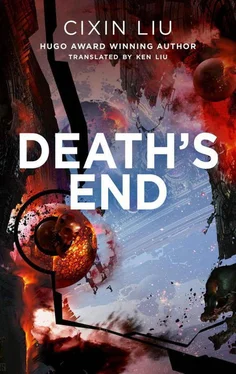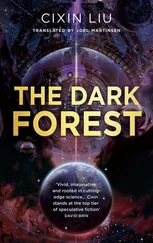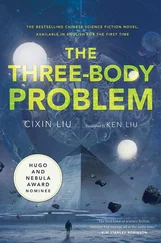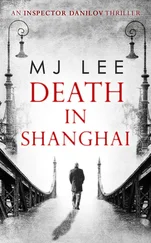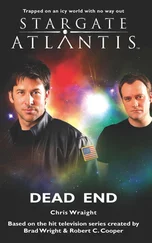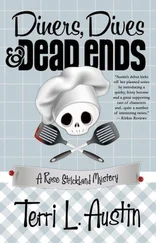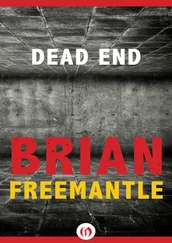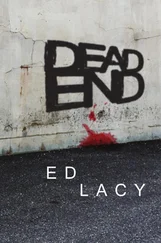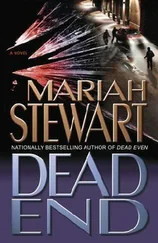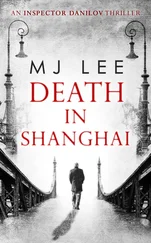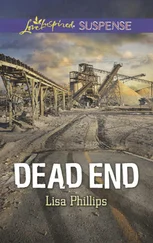“Yes. Isn’t there some system to help with interpretation?”
“Child, we’re talking about carving in stone, not a computer. How can we possibly fit something like that here?”
AA looked at the cave wall and then stared at Luo Ji. “You’re saying that we’ve carved things here that we don’t even understand with the hope that someday, some extraterrestrial will be able to read them?”
True, to the extraterrestrial discoverers of the far future, the human classics left on the walls here would probably resemble Linear A, Cretan hieroglyphics, and other ancient scripts that no one could read. Perhaps there was no realistic hope that anyone would. By the time the builders of this monument truly understood the power of time, they no longer believed that a vanished civilization could really leave behind any marks that would last through geologic eons. As Luo Ji had said, this wasn’t a museum.
A museum was built for visitors; a tombstone was built for the builders.
The three continued onward, and Luo Ji’s cane tapped along the ground rhythmically.
“I often stroll around here thinking my own crazy thoughts.” Luo Ji paused and pointed at a relief carving of an ancient soldier in armor and wielding a spear. “This is about the conquests of Alexander the Great. If he had kept on going a bit farther east, he would have encountered the Qin at the end of the Warring States Period—what would have happened then? And how would history have changed?” They walked some more, and he pointed at the cave wall again. By now, the characters carved on the wall had turned from Small Seal Script to Clerical Script. “Ah, we’ve reached the Han Dynasty. From here to later, China completed two unifications. Are a unified territory and a unified system of thought good things for civilization as a whole? The Han Dynasty ended up endorsing Confucianism above all, but if the multiplicity of schools of thinking during the Spring and Autumn Period had continued, what would have happened later? How would the present be different?” He waved his cane around in a circle. “At every moment in history, you can find endless missed opportunities.”
“Like life,” said Cheng Xin softly.
“Oh, no no no.” Luo Ji shook his head vigorously. “At least not for me. I don’t think I’ve missed anything, haha.” He looked at Cheng Xin. “Child, do you think you’ve missed out? Then don’t let opportunities go by again in the future.”
“There’s no future now,” said AA coldly. She wondered if Luo Ji was suffering from dementia.
They reached the end of the cave. Turning around to survey this underground tombstone, Luo Ji sighed. “We had designed this place to last a hundred million years, but it won’t even survive a hundred.”
“Who knows? Perhaps a flat two-dimensional civilization will be able to see all this,” said AA.
“Interesting! I hope you’re right…. Look, this is where the artifacts are kept. We have a total of three halls.”
Cheng Xin and AA saw space open up before them once more. The room they were in didn’t resemble an exhibit hall so much as a warehouse. All the artifacts were placed in identical metal boxes, and each box was labeled in detail.
Luo Ji tapped one of the nearby boxes with his cane. “As I said, these are not so important. Most of these objects have longevities shorter than fifty thousand years, though some of the statues can survive up to a million years. But I suggest you not move the statues: Though the gravity makes them easy to move, they take up too much space…. All right, pick whatever you like.”
AA looked around excitedly. “I suggest we take paintings. We can forget about old classics and ancient manuscripts—no one will understand those.” She walked in front of one of the metal boxes and pushed what looked like a button on top, but the box didn’t open by itself, and there were no instructions. Cheng Xin walked over and struggled to lift the cover open. AA took out an oil painting.
“I guess paintings take up a lot of space, too,” said AA.
Luo Ji picked up a set of work overalls from on top of another box and retrieved a small knife and screwdriver from the pockets. “The frame takes up a lot of space. You can take it off.”
AA picked up the screwdriver, but before she could get started on the painting, Cheng Xin cried out. “No!” The painting was Van Gogh’s Starry Night.
Cheng Xin’s surprise wasn’t just because the painting was valuable. She had seen it once before. Four centuries ago, right after she had started working at the PIA, she had visited New York’s Museum of Modern Art on a weekend and saw a few of Van Gogh’s paintings. Van Gogh’s representation of space had left a deep impression on her. In his subconscious, space seemed to have structure. Cheng Xin wasn’t an expert in theoretical physics back then, but she knew that according to string theory, space, like material objects, was made up of many microscopic vibrating strings. Van Gogh had painted these strings: In his paintings, space—like mountains, wheat fields, houses, and trees—was filled with minute vibrations. Starry Night had left an indelible mark in her mind, and she was amazed to see it again four centuries later on Pluto.
“Get rid of the frame. That way, you can take more.” Luo Ji waved his cane carelessly. “Do you think these objects are still worth a city’s ransom? Now, even a city is worthless.”
And so they pried away the frame that was perhaps five centuries old, but they kept the hard backing to avoid damaging the painting by bending the canvas. They continued to do the same to other oil paintings, and soon, empty frames littered the floor. Luo Ji came over and put his hand on a small painting.
“Would you leave this one for me?”
Cheng Xin and AA moved the painting aside and set it on top of a box next to the wall. They were surprised to see that it was the Mona Lisa.
Cheng Xin and AA continued to work at disassembling frames. AA whispered, “Clever old man. He kept the most expensive piece for himself.”
“I don’t think that’s the reason.”
“Maybe he once loved a girl named Mona Lisa?”
Luo Ji sat next to the Mona Lisa and caressed the ancient frame with one hand. He muttered, “I didn’t know you were here. Otherwise I could have come to see you often.”
Cheng Xin saw that he wasn’t looking at the painting. His eyes stared ahead as if looking into the depths of time. Cheng Xin saw that his ancient eyes were filled with tears, and she wasn’t sure if she was mistaken.
Inside the grand tomb under the surface of Pluto, lit by the dim lamps that could shine for a hundred thousand years, Mona Lisa’s smile seemed to appear and disappear. The smile had puzzled humankind for nearly nine centuries, and it looked even more mysterious and eerie now, as though it meant everything and nothing, like the approaching Death.
Bunker Era, Year 68 The Two-Dimensional Solar System
Cheng Xin and AA carried the first batch of artifacts to the surface. Other than a dozen or so frameless paintings, they also carried two bronze ritual vessels from the Western Zhou Period and some ancient books. Under standard 1G gravity, they would not have been able to move all these, but with Pluto’s weak gravity, it didn’t require too much effort. Going through the air lock, they were careful to close the inner door first before opening the outer door, lest they and the artifacts be blown into the open by escaping air. As soon as they opened the outer door, the small amount of air inside the air lock turned into a flurry of ice crystals. Initially, they thought the ice crystals were illuminated by the searchlight on Halo, but after the flurry subsided, they realized that Halo ’s searchlight had already shut off. Some source of light in space illuminated Pluto’s surface, and Halo and the black monolith cast long shadows on the white ground. They looked up, and backed up two steps with shock.
Читать дальше
